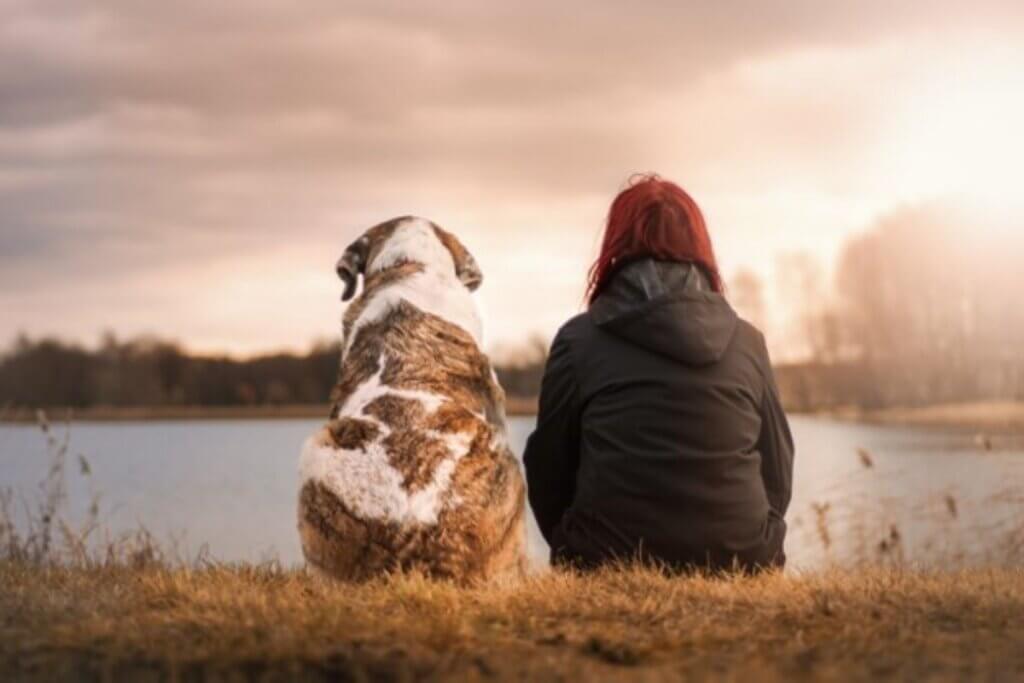Grieving the Loss of an Animal Companion
When animal companions come into our lives, we often become attached so quickly that we can’t remember ever not having them with us. With all the happy moments we get to share with them, it’s also likely that we will see their last moments—which can be some of the hardest. As challenging as this loss is, we must find ways to process and understand our grief over losing our animal companion to maintain our mental health—not only for ourselves but also so we can continue helping other animals who need us. An important part of grieving an animal companion is knowing that it’s OK to cry and that the grief you’re feeling is totally valid. The strong emotions that follow their passing are a sign of love and compassion, not weakness.
I’ve adopted and cared for many beloved animal companions in my life, and most of them have passed on for different reasons. When I lost them, I sometimes felt as though people didn’t take the loss seriously—and that was incredibly hurtful. Even though I knew I had done all that I could at the time, I’ve also blamed myself for decisions that I did or did not make leading up to their passing. Our grief can be complex and difficult to work through, but hopefully this advice can help guide you. No loss is the same as another, so handling your grief patiently and thoughtfully is crucial. Remember, this is just advice—please speak to a mental health professional if you need extra support. 💗 It’s always OK to ask for help!
Loss
There are many ways death can occur for our animal companions. It can be expected following a long-term illness or when they’re at the end of their natural lifespan. This reality can lead to anxiety over how and when they will pass as well as over making important decisions for their health when it begins to decline. While we should always make choices for our loved ones that are in their best interests and result in as little suffering as possible, it can be hard to accept that some things are out of our control and that ruminating over them too much is unhealthy and unhelpful.
Habits like these can result in lack of sleep, difficulty focusing, and other symptoms commonly associated with depression and anxiety. You can prevent these issues from occurring by consulting with a vet when you have questions or concerns, speaking openly with people you’re close to (or even a therapist) about what’s on your mind, and maintaining healthy habits like eating nutritious foods, moving your body (de-stress with these animal-inspired yoga poses), and doing activities that bring you joy.
Unexpected deaths can bring about other issues, like wishing we had made different choices as well as shock and even trauma in some cases from what occurred. Seeing our loved ones suffer and die can seriously affect our mental health. Even if an animal companion passes away in the most peaceful way possible, losing them is typically heartbreaking—but that goes to show us how deeply we loved and cared for them.

Grief
Because of speciesism in this world, sometimes people can minimize someone’s experience of losing and grieving an animal companion. Whether they’re a dog, cat, rat, or fish, you probably see them as a family member you loved dearly. Just like humans, other animals feel love, pain, joy, and fear, so they connect with us on an emotional level and form close-knit relationships with us. It’s completely normal to need time and space to grieve not having someone you love around anymore. Grief is love with nowhere else to go.
Approaching the grieving process with gentleness and patience toward yourself is key. Let yourself feel. That may involve taking time off school and work, seeking therapy, enjoying comforting meals like this enchilada pie, or spending time outdoors. Sometimes, distractions can be good in those moments when we’re getting into thought patterns about a deceased loved one, but engaging in behaviors like doomscrolling TikTok for hours on end can become an escape rather than a temporary distraction. Be on the lookout for times when grief becomes unmanageable on your own. 💞 TBH, grief never fully goes away, but I can say from personal experience that with time, you’ll eventually be able to look at photos of your animal companion again and remember all the good times you shared with them instead of just sad memories.
If you share your home with multiple animal companions, keep their grieving process in mind as well—and make sure that you’re supporting them. If you notice they’re depressed, they need to see a vet. Signs of depression in our animal companions include loss of appetite, changes in sleep, and disinterest in things that typically bring them joy. You can help prevent this by keeping up with their usual routines and giving them plenty of attention if they’re in the mood to interact. If it’s an option, allow them to view the body of the deceased so that they can get closure by understanding what happened to their friend. Don’t rush into adopting another animal—even if this is for your other animal companions’ sake. It’s important to always be certain you have the time, attention, and resources to give to another individual who will depend on you completely and to understand that your other animal companion(s) may need some time to grieve, too.
Guilt
Guilt is a feeling that often follows the loss of an animal companion. Perhaps you could have done something differently, but that doesn’t mean that dwelling on the past or engaging in negative self-talk is constructive. Instead, we should learn from what has happened and use that knowledge for future experiences. Recognize why you’re feeling guilty—and ask yourself whether that feeling is even rational. For example, needing to euthanize a suffering animal because there’s no way for them to continue living comfortably is actually in their best interest. They’re now at peace—no longer suffering—and if they could come back and thank you for giving them desperately needed relief from pain, they would. Euthanasia to end suffering is the greatest act of kindness and compassion that a human can give another animal. This decision is so painful because we love them and don’t want to lose them.
If you’re struggling with guilt, consider writing a letter to your animal companion expressing your feelings. It can also be useful to share what’s on your mind with someone you can confide in so that they can help you rationalize your feelings. Keep in mind that no one is perfect—and that even if you had done something differently, the outcome may have been the same or worse. As hard as it may be to accept and as much as we may wish our animal friends could stay with us forever, everyone passes away eventually. 🤍
Healing
Healing looks different for everyone, but it’s important to remember that it is done in your own time and can happen in different ways. One beautiful way to honor your animal companion is by creating an altar. 🕯️ This can be a way to celebrate their life and find closure. Reading books, listening to podcasts, or looking at art about loss can help with healing—even if these things aren’t specifically about losing an animal companion.

*****
When supporting friends or family members who are grieving the loss of an animal, sometimes just being there to listen and keep them company helps. Kind gestures like cooking or ordering vegan meals for them, helping with chores, checking in regularly by texting or calling, and handling tasks that may be difficult for them (like going to pick up the animal’s ashes from the vet) can mean a great deal. Never belittle them for how long or intense their grieving process may be, and give them space if that’s what they want. We all handle grief differently, and that’s OK.
If you want to share some happy memories of your animal companion, we’d love to hear them. 🙂 You can send us an e-mail at [email protected]. Below are some grief resources you may find useful. Thank you for all the love and care you gave your animal companion throughout their life. Take care!
Resources
- Association of Pet Loss and Bereavement
- The American Veterinary Medical Association
- Pet Loss Grief Support
- The Rainbow Bridge
- Dead Pet Girls
- Help Hotlines for Humans
- The Loss of a Pet: A Guide to Coping With the Grieving Process When a Pet Dies by Wallace Sife, Ph.D.
- My Pet Died by Rachel Biale
- How Animals Grieve by Barbara J. King
Text peta2 to 30933 for ways to help animals, tips on compassionate living, and more!

Terms for automated texts/calls from peta2: http://peta.vg/txt. Text STOP to end, HELP for more info. Msg/data rates may apply. U.S. only.




